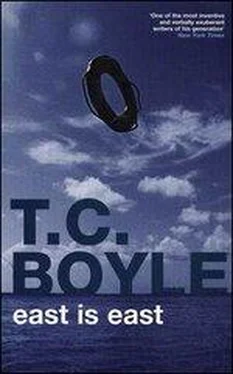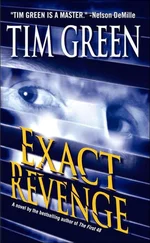Tom Boyle - East is East
Здесь есть возможность читать онлайн «Tom Boyle - East is East» весь текст электронной книги совершенно бесплатно (целиком полную версию без сокращений). В некоторых случаях можно слушать аудио, скачать через торрент в формате fb2 и присутствует краткое содержание. Жанр: Современная проза, на английском языке. Описание произведения, (предисловие) а так же отзывы посетителей доступны на портале библиотеки ЛибКат.
- Название:East is East
- Автор:
- Жанр:
- Год:неизвестен
- ISBN:нет данных
- Рейтинг книги:5 / 5. Голосов: 1
-
Избранное:Добавить в избранное
- Отзывы:
-
Ваша оценка:
- 100
- 1
- 2
- 3
- 4
- 5
East is East: краткое содержание, описание и аннотация
Предлагаем к чтению аннотацию, описание, краткое содержание или предисловие (зависит от того, что написал сам автор книги «East is East»). Если вы не нашли необходимую информацию о книге — напишите в комментариях, мы постараемся отыскать её.
, praised by
in
as "one of the most exciting young fiction writers in America," the result is a sexy, hilarious tragicomedy of thwarted expectations and mistaken identity, love, jealousy, and betrayal.
East is East — читать онлайн бесплатно полную книгу (весь текст) целиком
Ниже представлен текст книги, разбитый по страницам. Система сохранения места последней прочитанной страницы, позволяет с удобством читать онлайн бесплатно книгу «East is East», без необходимости каждый раз заново искать на чём Вы остановились. Поставьте закладку, и сможете в любой момент перейти на страницу, на которой закончили чтение.
Интервал:
Закладка:
“Ruth,” Clara choked, miserably gobbling at the sliver of toast and fish eggs spread flat in her miserable palm. Her wild eye seemed wilder than ever. And yes, those were tears.
“Terrific,” Peter Anserine said, “absolutely. Best party I’ve been to since I left Boston last spring.”
Ruth lingered, taking advantage of the moment’s awkwardness to draw Anserine out, quiz him when his defenses were down. And did he miss Boston? He was going to be at Amherst in the fall, wasn’t he? Was it for the semester or the year? And then back to Boston, or—?
“Well, yes,” he said in answer to this last, casting a sidelong glance at the servant slicing by with a tray of eatables, “Boston is my town, after all. But then, of course, I’ll have to find bachelor digs. To be close to the children.”
Clara was absorbed in her food, hunched over still, concentrating on the tricky juggle of napkin, glass and morsel.
“Wonderful,” Ruth said, “just wonderful. We’re going to miss you here, we really are.” There was an awkward interval during which no one spoke. The band broke off and then lurched into a reedy rendition of “Nature Boy,” and Peter Anserine gave Ruth a long slow strictly noncollegial look. She shifted her feet, drained her glass and sighed. “Well, I guess I’ve got to go find Sax,” she said. “Have a good one.”
And then she was working her way toward the bar, exchanging greetings with people she knew from Darien or her trips to the Tupelo Shores beach with Saxby—looking for Sandy, Irving Thalamus, anybody. She paused to scan the dance floor and take a glass of champagne from a black servant with an immovable face and hair as uniformly white as a cup of detergent. The band had switched to something with a heavy backbeat that felt a lot like reggae, and as the dancers separated from their “Nature Boy” clinches and began to flail their limbs to the spastic beat, Ruth spotted Sandy dancing with a girl she’d never seen before—very young-looking, barely pubescent in fact, but a beauty and born to it. Ruth wondered who she was and felt a small stab of regret as Sandy moved in close, but then Abercorn’s dyed pelage and speckled face came into view, riding atop the heads of the others as if thrust up there on the end of a stick, jerking rhapsodically to the beat. And who was it he was dancing with? The crush of bodies closed in for half a beat and then fell back, and Ruth was amazed to see Ina Soderbord opposite him, wriggling her big hips and shoulders and bust as if she’d just been hosed down. And then the crowd drifted into a new pattern and Bob Penick and his wife (hair the color of chicken liver, shiny prom dress with wilted corsage) writhed into view, not ten paces from Ina. They were doing a modified frug, a dance Ruth had learned—and abandoned—in high school.
She finished her champagne—was that her third glass?—and took another from the man with the iron face. (She wanted to tease him the way people tease the guards outside Buckingham Palace—tickle him or blow in his ear or something—but she thought better of it: after all, how much latitude could you expect from an old black man in a starched tuxedo at a white people’s party in Georgia?) She was feeling a bit giddy, enjoying herself even if she had been denied her entrance. Abercorn with Ina Soderbord. It was funny: the pale with the paler still. And what if they had children? They’d be eyebrowless, hairless, white as grubs, with little pink fishy eyes, and they’d grow up to be giants upon the earth, with shoulders and tits and feet that would give shoe salesmen nightmares. The boys would buy cheap overcoats and the girls would hyphenate their names—Soderbord-Abercorn—and people would think they were an agricultural product, something to spray on the crops to prevent cutworm. Oh, yes, it was hilarious. And Ruth was giddy. But where was Sax?
It was then that the band pulled the string on the horns and rolled into a piano-thumping boogie-woogie—they were eclectic, all right—and Irving Thalamus’s dry sniggering laugh jumped out at her from the direction of the bar. She turned and elbowed her way through the crowd, following the sound as unswervingly as a cat stalking a rustle in the grass. A pair of minor poets and a clutch of old ladies in pink chiffon gave way, and there he was—Thalamus—leaning against the bar and laughing down the front of Regina Mclntyre’s dress. Regina was showing acres of dead-white shoulder and bosom, and she was wrapped in a black leather dress that gave her the look of an extra in a movie about outer space vampires. But Ruth’s eye didn’t rest long on Regina or Thalamus either, because at that moment she spotted Saxby at the far end of the bar, and in the next she felt hot and sick and panicky all at once, felt like Madama Butterfly when they come to take her child away: Saxby was with Jane Shine.
Jane Shine.
It was a blow, and it staggered her. There she was, the woman she loathed more than anyone alive, her enemy, her nemesis, her bugaboo, and she had Saxby in her grip. Flawless, sickening, cool as a model poised on the runway, she was leaning into Saxby, one cold white hand fixed like a grappling hook to his arm. Ruth saw black silk and diamonds, hair on the attack, a roiling cloud of it enveloping Saxby in its fatal nimbus, and all at once she pictured him in the Jaguar, Jane Shine established as the doyenne of Thanatopsis House, her own stay cut mysteriously short. It was too much. She couldn’t handle it. She recoiled as if from some unthinkable horror—Saxby hadn’t seen her yet, nor Shine nor Thalamus either—and then Regina’s eyes caught hers and Regina smiled—or smirked—and Ruth was fighting her way back through the crush, Thalamus’s tentative “Ruthie?” floating somewhere behind her, the piano player up off his stool and banging the keyboard now with his feet and elbows and hams, the crowd roaring, roaring.
Stabbed in the back. Betrayed. A moment ago she’d exulted in Clara Kleinschmidt’s tears, above it all, Olympian, La Dershowitz, and now—now she felt the tears burning in her own eyes. How could he? How could he even talk to her? Ruth pushed blindly through the crowd. She felt as if she’d been slapped in the face, humiliated, and there was nothing to do but hide herself, run. She shoved past the old waiter— Out of my way, Uncle Tom, she thought bitterly—and he gave her a look, nothing more than a fractional lift of the eyelids, that said shame, and the whole group of wispyhaired lawyers did a little dance step to avoid her. She was vaguely aware of the horns ricocheting off the canvas above her as the song ended in a slamming excruciating finale, and then she saw the rosy exit looming up before her.
She was there— Just let me hold it back, she prayed, please god don’t let me break down yet —there under the bower, practically running, when Septima appeared at the other end. Made up to look twenty years younger, her hair tinted and curled, her gown alone worth more than every scrap of clothing in the place combined and her jewelry liberated from the safe deposit box, Septima was making her own grand entrance. On Owen’s arm. She seemed to stagger on her heels as Ruth came at her, and she forced her lips into a smile. “Why, Ruthie,” she gasped, stopping her with a veiny desiccated hand, a hand that felt to Ruth like the touch of death, “whatever has happened to you? You’re pale as a ghost.”
A ghost, yes: she was already gone. And what did Septima care? Or Owen—smirking at her, looming up out of the night like an executioner? They probably had her bags packed for her already—she was nothing here, insubstantial, a ghost, and Jane Shine was all and everything. “I—it’s nothing,” she stammered, her eyes full, “I’m just not … I can’t—” and then she let it go, shook off the old hag’s hand and bolted across the lawn, all the bile of her eighteen years of setback and denial rising in her throat.
Читать дальшеИнтервал:
Закладка:
Похожие книги на «East is East»
Представляем Вашему вниманию похожие книги на «East is East» списком для выбора. Мы отобрали схожую по названию и смыслу литературу в надежде предоставить читателям больше вариантов отыскать новые, интересные, ещё непрочитанные произведения.
Обсуждение, отзывы о книге «East is East» и просто собственные мнения читателей. Оставьте ваши комментарии, напишите, что Вы думаете о произведении, его смысле или главных героях. Укажите что конкретно понравилось, а что нет, и почему Вы так считаете.











